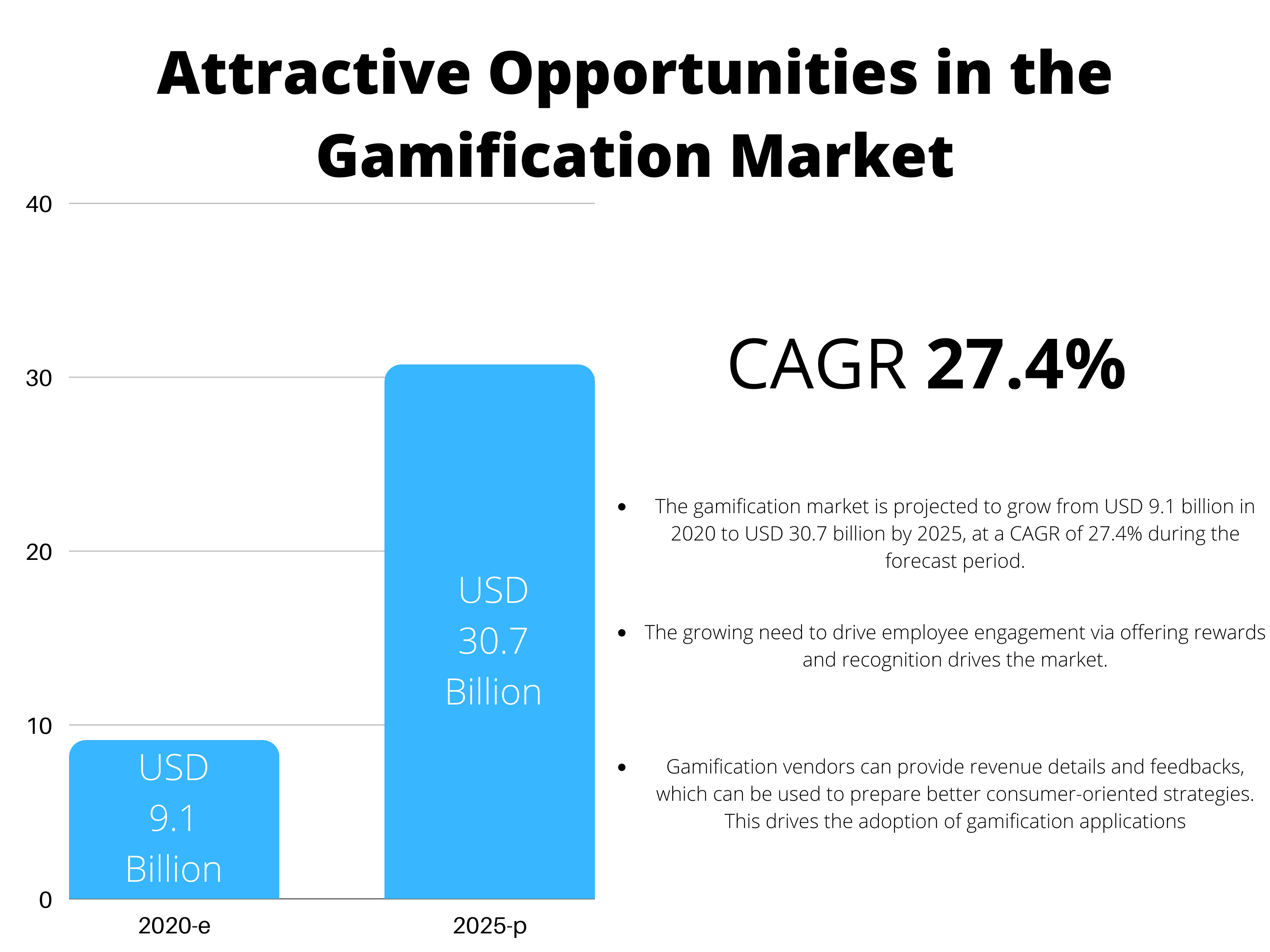Gamification Market Global Forecast to 2025
Tuesday, July 28, 2020
The gamification market size is projected to grow from USD $9.1 billion in 2020 to USD $30.7 billion by 2025, at a Compound Annual Growth Rate (CAGR) of 27.4% during the forecast period. The major factors driving the growth of the gamification market include rewards and recognition to employees over performance to boost employee engagement, provision of lucrative offers to the customers and consumers, and gamification yielding higher Return on Investment (ROI).

Services segment to grow at the higher CAGR during the forecast period
Based on components, the services segment of the gamification market is projected to grow at the higher CAGR during the forecast period. Gamification service providers render a variety of services, which are categorised into consulting, implementation, and support and maintenance services. These services provide end-users with services for gamification solution development and smooth installation, deployment, and maintenance of ongoing solutions. Certain service providers assist end-users in customised solution development for their organisation. These service providers handle the implementation of solutions that are tailored to fit the business processes, such as customised solutions
Telecom segment to grow at a highest CAGR during the forecast period
Based on verticals, telecom segment to grow at highest growth rate during the forecast period. Telecom companies also face severe competition from other service providers, due to which the adoption of a customer-centric approach has become very crucial. Increasing the number of subscribers with consistent experiences across all channels is the main goal of companies, which can be achieved only through customer-focused offerings. Since the customer has become highly informed and is likely to avail multiple services, companies have to incorporate gamification in their business models. These companies have limited jurisdiction over the content and offerings, but the customer is going to hold them accountable for quality and availability. With the gamification solution, companies can know about consumer satisfaction and engage them for new offers and rewards.
North America to record the highest market share in 2020
The North America region has been a predominately receptive market toward the adoption of gamification solutions. There has been an expansive usage of the internet to connect with various channel partners and clients among enterprises. The high adoption of customer-based solutions and enterprise-based solutions are driving the gamification market in North America. Moreover, in this region, countries such as the US and Canada are adopting gamification solutions to enrich their marketing activities with better advertising, customer interaction, and branding and selling. Furthermore, the rising demand for cloud-based gamified solutions among enterprises due to its low implementation cost has helped the gamification market to grow at a significant pace. Presently, the gamification market in North America is contributing a large portion of revenue as compared to the other regions.
Key Market Players
Key market players profiled in this report include Microsoft (US), SAP (Germany), BI WORLDWIDE (US), Verint (US) Aon (UK), Hoopla (US), Centrical (US), Mambo.IO (UK), MPS Interactive Systems (India), Influitive (Canada), LevelEleven (US), Ambition (US), Axonify Inc. (Canada), Gamifier (Latin America), IActionable (US), Khoros (US), Scrimmage (US), Xoxoday (India), Tango Card (US), and NIIT (US). These players have adopted various growth strategies, such as partnerships and new service launches to expand their presence further in the gamification market and broaden their customer base.
SAP offers its SAP cloud platform gamification, which helps in the rapid integration of gamification concepts into applications. This solution includes an online development and operations environment called gamification workbench to implement and analyse gamification concepts. The company’s gamification solution provides support for sophisticated concepts, covering time constraints, complex nested missions, and collaborative games. It also has a built-in analytics module that helps in advanced analysis of the player's behaviour for continuous improvement of game concepts. The company uses gamification in multiple applications, such as SAP Community Network, SAP TwoGo, SAP Fitness application, and other SAP applications. SAP is also known to be taking interest in the gamification market as the company made multiple acquisitions over the past few years. It acquired CallidusCloud, a provider of cloud-based solutions for sales effectiveness, sales performance management, and sales execution software and services in April 2018. It further acquired Gigya, a provider of customer identity and access management platform, in September 2017. These acquisitions will help SAP to increase its offerings in gamification market as the acquired companies were prominent players in the gamification market.
Recent Developments
In September 2019, Microsoft added new features and applications for Dynamics 365 by adding AI-driven insights. This product enhancement will empower organisations to take informed actions and improve their customer experiences.
In January 2019, SAP acquired Qualtrics, an experience management software provider. This acquisition will help SAP to deliver exceptional customer, employee, product, and brand experiences. This acquisition will accelerate SAP’s new experience management category by combining Qualtrics’ experience data with operational data from the SAP software.
In January 2020, BI WORLDWIDE partnered with Vitality, a behaviour change platform provider. Both companies collaborated to improve the overall employee health. BI WORLDWIDE’s recognition system is integrated with the new Vitality One program to reward employees for leading active and healthy lifestyles
In August 2019, Verint partnered with the authorities of the city of Barrie, Ontario. This partnership helped Barrie city to simplify, modernise, and automate its customer service operations for improved overall customer experience and employee satisfaction. Verint used its engagement management offerings to help Barrie expand its access and support to all citizens across channels, including the city’s customer portal, online forms, and web chat.
In April 2018, SAP acquired Callidus Software, a provider of enterprise software and Software-as-a-Service (SaaS). This acquisition helped SAP strengthen its intelligent customer experience suite of solutions. This acquisition will help SAP to strengthen its front office suite from only Customer Relationship Management (CRM) to an intelligent customer experience suite. The front office suite consists sales, customer data, marketing, service, and commerce solutions.

